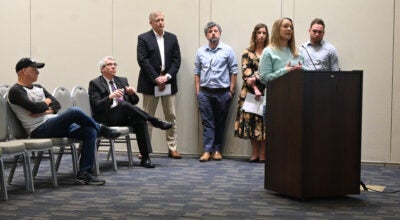NC appeals judge censured for ‘toxic work environment’
Published 12:00 am Saturday, December 19, 2020
By GARY D. ROBERTSON
Associated Press
RALEIGH (AP) — A North Carolina Court of Appeals judge was censured on Friday after a judicial investigation determined his refusal to squarely address his chief aide’s bullying, profanity and dishonesty caused a “toxic work environment” for female law clerks who worked for him.
State Supreme Court justices unanimously affirmed the recommendation by the state Judicial Standards Commission that Judge Hunter Murphy violated the state Code of Judicial Conduct and brought the judicial office into disrepute with his actions.
The commission’s investigation found Murphy “downplayed, minimized and mischaracterized” the behavior of his executive assistant in 2017 to a human resources employee and commission leaders. The male assistant was a close, personal friend of Murphy’s from high school whom the judge hired. Murphy ultimately asked him to resign in early 2018.
Murphy was not immediately made aware of the entirety of his assistant’s misconduct, according to the Supreme Court’s order. But the judge “seemed more concerned with discounting the importance of actions that occurred while he was absent instead of understanding the effect of (the aide’s) behavior on his coworkers,” the order reads.
The justices agreed with the commission’s recommendation that a formal censure — essentially a public denouncement — was appropriate for Murphy, rather than a more severe suspension or removal from office. The court also could have issued a lesser public reprimand or chosen not to punish him at all.
The commission of judges, attorneys, and other citizens found that Murphy, a registered Republican elected in 2016, also joined with his assistant in making belittling comments about a male law clerk who resigned less that two months after taking the job.
The assistant also made sexually inappropriate remarks, Friday’s order said. One female clerk decided against Murphy’s offer to extend her clerkship further because of the work environment, while another quit eight months early. Issues within Murphy’s courtroom office ultimately led an unnamed Court of Appeals judge to contact Chief Judge Linda McGee about them.
Murphy’s action “not only undermines the dignity of the Court of Appeals, but negatively impacted the court’s work product, court employees and the reputation and integrity of the judiciary,” the commission wrote, according to Friday’s order.
Bob Orr, a former associate Supreme Court justice who represented Murphy in the proceedings, said his client accepts the decision — the final word on the matter — even as they vigorously contested the matter.
Orr filed a lengthy brief for Murphy challenging the commission’s declared facts and the procedures.
“I find it one of the most disappointing decisions that I’ve read in my career,” Orr said in a phone interview.
Murphy is one of 15 members on the intermediate Court of Appeals, which usually meets in panels of three to hear cases from trial courts. Murphy’s term ends in late 2024.





